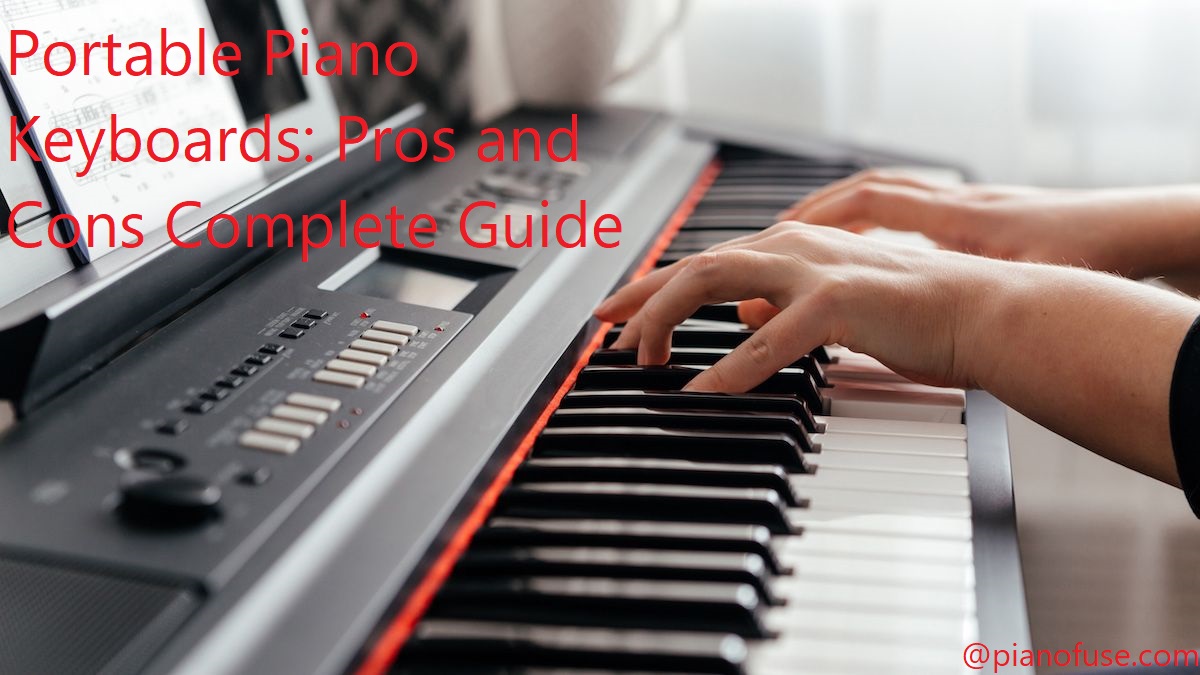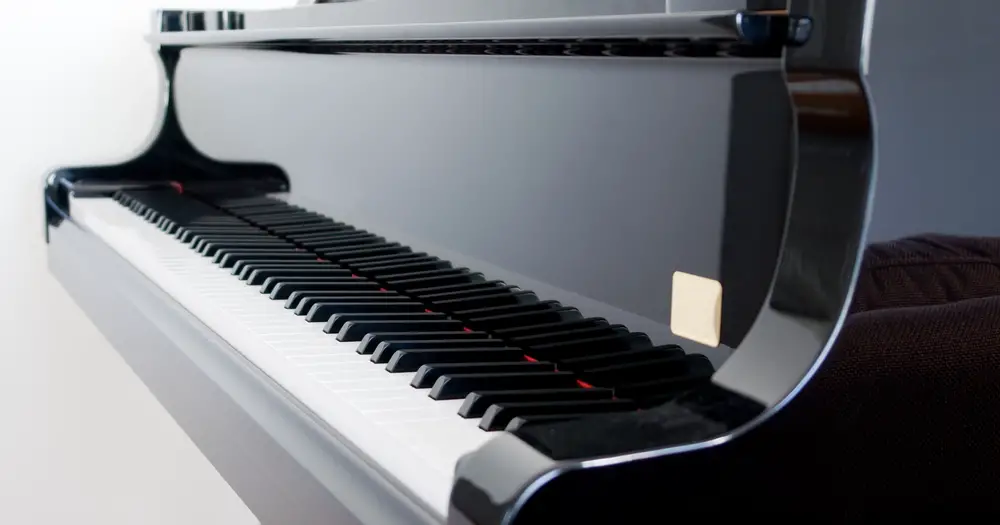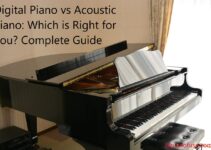Do you wish to make your musical dreams come true with a portable piano keyboard? This article will guide you through the advantages and disadvantages of owning one.
From the convenience of portability to compromised sound quality, discover all you need to know before investing in a top-notch device. Whether you are a music enthusiast or a beginner, you can finally decide on the perfect piano keyboard for yourself!
Portable piano keyboards are great options for those who would like to learn and practice piano without the need for a large, expensive instrument. As accessible alternatives to traditional pianos, portable keyboards are popular with both beginners and professionals. While convenient, there are some important considerations when buying a portable piano keyboard such as size and weight, sound quality, portability, versatility, and accessories.
The purpose of this guide is to offer an overview of the features of different types of portable keyboards as well as their pros and cons. We will also discuss how to choose the right keyboard for your needs. We hope this article gives you the knowledge you need in order to make an informed choice about your purchase.
Brief explanation of what portable piano keyboards are
Portable piano keyboards provide the convenience of a full-size traditional piano in a much more portable size. They typically have fewer keys than standard pianos, and their sound may be slightly less complex. However, they are an excellent option for musicians who prefer portability over the grandeur of a full-sized instrument. Additionally, they usually come with built-in speakers, allowing them to be used without the need for any extra equipment.
Portable keyboards are also highly customizable and can connect to external devices such as sound systems or computers. This provides several additional opportunities for musical expression and experimentation. Further, due to their lightweight and durable design, most portable models can easily fit into cramped spaces or be carried wherever you need them to go.
Despite their advantages, however, there are several drawbacks associated with portable keyboard pianos that should be considered before purchasing one. For starters, most models don’t offer the same acoustics or range of tones available from a grand or digital piano due to the smaller selection of audio samples available on some models. Additionally, some people may find that button layouts on smaller keyboards can feel cramped when playing more complex pieces of music which may require heftier fingering techniques than standard keyboards offer; this is especially true for players who have larger hands and fingers than average. Finally, although most portable keyboard pianos do boast a wide range of real-time controls – such as pitch bend capability – it’s important to note that some more advanced features might not be available on all models due to their compact size and enhanced portability capabilities.


Importance of discussing pros and cons of portable piano keyboards
In the modern music industry, portable piano keyboards have become increasingly popular. These types of keyboards are lightweight, easy to transport and usually inexpensive. They offer ideal options for people who need a keyboard that is responsive to touch as well as sound quality. However, there can be some disadvantages to these keyboard models that should also be taken into consideration when making a choice for musical performance or learning.
For potential buyers, understanding the pros and cons of portable piano keyboards is important in helping them make an informed decision when purchasing the item. It is imperative that individuals take the time to research the advantages and disadvantages of these types of pianos in order to accurately choose one that suits their needs and skill level best.
The pros of using a portable keyboard include being able to learn new techniques faster due to its slim footprint, having access to built-in effects for practice or performance and having many output ports for connecting equipment like audio interfaces or digital mixers with sequencing software such as Logic Pro X or Ableton Live. Additionally, they are lightweight and can easily fit into laptop bags alongside other electronic gear.
When deciding on whether or not a specific model is right for an individual’s needs, it is important to consult with seasoned professionals who may have experience in playing such models before making any purchase decisions. The cons of using a portable piano includes their size which can limit the amount of weight and space available on stage (which could potentially cause fatigue during long performances), their low number of keys (usually 88 keys instead of 88 weighted hammer action keys) which can result in difficulties transitioning from practicing on one type of keyboard at home and playing on another type on stage as well as lacking proper weighting mechanisms prompting users taking up more energy while attempting complex pieces like Beethoven’s masters works etcetera.
Understanding these differences enable individuals make sound decisions when selecting equipment ideal for their needs as they strive towards employing strategies allowing them reach professional level performance standards.
Pros of Portable Piano Keyboards
Portable keyboards with weighted keys can provide you which a great playing experience like no other. They are easy to transport and convenient when space is at a premium. Here are some of the key advantages of portable piano keyboards:
- Portability – as mentioned above, portability is one of the major benefits in having a portable keyboard piano. You can take your instrument with you wherever you go, making it easier to practice and play for friends and family.
- Lower cost – compared to regular-sized pianos, portable pianos offer the same features at a much lower price point, making them accessible for people on any budget.
- Full-size keys – despite their small size, portable pianos usually offer full-sized keys which provide an authentic feel when playing your favorite pieces of music.
- Touch sensitivity – some models offer advanced touch sensitivity features that provide more expressive dynamics when playing individual notes or chords.
- Special effects – with some models offering on board effects, you can further customize the sound and create unique performances without needing an external setup.
Portability: easy to move around and take to gigs or practice sessions
Portability is one of the major benefits associated with portable piano keyboards. Many of these models are lightweight, making them incredibly convenient and easy to take with you wherever you go. For instance, if you have a gig in another town or state, you don’t have to worry about transporting your regular piano since a portable keyboard can easily fit in the back seat of your car or on the airplane with you. Additionally, if you need to practice at a different space than your home studio on a regular basis (such as a friend’s house), it will be easy to just grab your portable keyboard and go.
For those who only need basic features and don’t mind compromising on sound quality, portable keyboards can provide everything necessary for practice and playing live gigs. Most of these models come equipped with basic effects, rhythms and styles that are built-in to the unit without having to purchase additional software or downloads. Furthermore, they often feature built-in speakers which provide great convenience compared to traditional console-style pianos that require external amplification equipment or monitors/PA systems.
Space-saving: ideal for people with limited space for a full-sized piano
Portable keyboards are perfect for those with limited space in their homes. Most traditional pianos require a large and dedicated area, with the need to be tuned and kept in adjustments on a regular basis. Portable keyboards present an ideal solution since they are small enough to fit in most homes while being large and sturdy enough to play comfortably without the need of purchasing a full-sized piano. They also come in different shapes and sizes so that musicians can easily find one that fits within the space they have available.
One key advantage of portable keyboards is their affordability. In some cases, they can cost less than the price of a regular piano, making them more accessible for budget-restricted musicians. They usually feature 61 keys, but there are larger models available with 76 or 88 keys which provide better sound quality. Portable keyboards also offer plenty of sounds and functions as well as built-in speakers which make playing easier and more enjoyable for performers at home or on stage. Additionally, some portable keyboards come prepackaged with recording capabilities, allowing users to capture bits of creative inspiration when it strikes them instead of having to purchase additional equipment or software like one needs for larger pianos or sound libraries.
These instruments do come with several downsides; however. There have been manufacturing issues throughout time that include keys sticking together amid being played which affects accuracy somewhat as well as quality control complaints made by customers on certain models purchased elsewhere. They also lack the strength and dynamics built into genuine acoustic instruments as well as the ability to actually touch and feel piano ivories when playing. This could be a critical element for some musicians who want an authentic experience when performing classical pieces that aren’t just about notes but rather about communication between players and instrumentation – something difficult when dealing with computerized imitation sounds from digital instruments but not impossible depending on quality machines available in each market today which can simulate nuances similar to real pianos where repertoire comes alive upon contact regardless whether it’s through traditional museum-quality grand pianos or inexpensive mini portable keyboard look-alikes so popular these days among beginner level students taking music lessons by trained professionals at elite academies worldwide where such tools exist side by side with famous vintage brand names still revered today – Staussmans plus Steinways just like Rimsky Korsakov would have played if still alive right after Bach himself if only given half an opportunity – one never knows!
Affordability: cheaper than traditional pianos and can offer more features
Portable piano keyboards are generally much cheaper than traditional pianos, not only in cost of the instrument but also the range of features included with the instrument.
Portable pianos typically offer more features than an acoustic piano, such as a range of tones, effects and musical accompaniment. These extra features are usually built directly into the keyboard, reducing both start-up costs and learning time.
Many portable keyboards even include MIDI capabilities allowing you to compose and record your own music. All of these extra features can make them very attractive to those starting out in music making or those on a budget but wanting to upgrade their sound.
Cons of Portable Piano Keyboards
Portable keyboards have a number of drawbacks when compared to traditional pianos or digital pianos, which should be taken into consideration when deciding whether to invest in one. The following are some major points of concern:
-Level of detail: Portable keyboards often lack the level of detail found in pianos and digital pianos. This means they usually have fewer keys, fewer types of sound sets and a reduced range (the maximum notes you can play).
-Sound Quality: Portable keyboards also tend to produce poorer quality sound than larger instruments, since their speakers are a lot smaller. Additionally, lower-end models may produce distorted sounds when played at high volumes.
-Durability: One final downside to consider is the overall durability of portable piano keyboards. Since most models consist mostly of plastic components, they might not stand up well to daily use or the occasional bump or drop.
Limited Sound Quality: may not match the sound quality of traditional pianos
Portable piano keyboards offer the convenience of being lightweight and compact, making them easier to transport than traditional pianos. That said, they may not provide the same level of sound quality as a real acoustic or digital piano.
With a portable keyboard, the number of keys and type of sound samples are often limited when compared to more expensive digital pianos, which can make it difficult to accurately recreate the sound of traditional instruments like strings and horns. As such, some players may find that their portable keyboard lacks the depth and complexity that they need to truly express their musicality.
Additionally, due to their smaller size and fewer keys, playing certain pieces on a portable keyboard can be quite challenging as there are simply not enough keys available.
Smaller keys: smaller keys can be difficult for people with larger hands or those used to traditional pianos
Smaller keys are one of the primary benefits to using a portable piano keyboard over a traditional instrument. These smaller keys make them much lighter and easier to transport, as well as more affordable since they require less material to construct.
However, their size can be difficult for people with larger hands or those used to traditional pianos. As such, they may require practice to learn how to adapt your playing style appropriately. Additionally, some models have small plastic keys which may reduce sensitivity compared to a full-size instrument.
Conclusion
In conclusion, portable piano keyboards are an excellent way to express your love of music from the comfort of your home. With a wide variety of styles available, it’s easy to find one that suits your needs and skill level. Portable pianos allow you the freedom to practice and perform anywhere while still maintaining many of the features of an acoustic piano.
One of the main advantages to purchasing a portable keyboard is their lower cost compared to larger, acoustic models. However, if you require more realism in sound and action, then an acoustic or digital model may be a more suitable choice for more extended musical practice and performance. Ultimately, it’s up to you to decide which type is best for your particular needs.
FAQ’S
Is portable piano good?
A portable piano can be good if you need an instrument that is lightweight and easy to transport. However, the quality of sound and key action may not be as good as a traditional piano.
Can you learn piano on a portable keyboard?
Yes, you can learn piano on a portable keyboard, but the quality of sound and key action may not be the same as a traditional piano, which can affect your technique and progress.
What is the difference between a keyboard and a portable piano?
A keyboard is a smaller, more lightweight instrument that typically has fewer keys and limited sound options. A portable piano is a larger instrument that is designed to be easily transported but has a more realistic key action and sound.
Should I buy a keyboard or digital piano?
It depends on your needs and budget. If you want a more realistic playing experience and sound, a digital piano may be better. If you need a more portable and affordable option, a keyboard may be a better choice.
What are the disadvantages of digital piano?
The disadvantages of a digital piano are that they can be expensive, require electricity to function, and the sound and key action may not be as realistic as a traditional piano.
What is the best portable piano?
The best portable piano depends on your needs and budget. Some popular options include the Yamaha P-125 and Roland FP-30.
How long do digital pianos last?
Digital pianos can last for many years with proper maintenance and care, but the lifespan can vary depending on the brand and model.
What type of piano is best for beginners?
A digital piano with 88 weighted keys and a sustain pedal is a good option for beginners.
Is 2 hours of piano enough?
Two hours of piano practice per day can be enough to make progress, but the amount of time needed to improve depends on the individual’s goals and skill level.
Should I play piano everyday?
It is recommended to practice piano regularly, ideally every day, to improve your skills and technique. However, the amount of time and frequency of practice may vary depending on your goals and schedule.
See Also:
- Best acoustic piano 2023
- Best digital piano for classical pianists 2023
- Best digital piano for under 1000 2023
- Best digital piano headphones 2023
- Best digital piano under 500 2023




